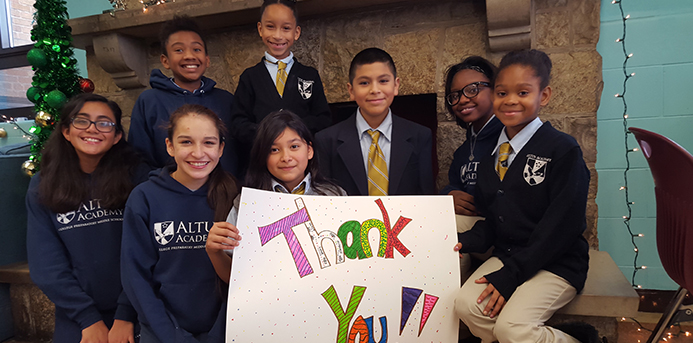Next year alone, more than 65 million children in the United States will grieve the loss of or separation from a family member because of death, divorce, life-altering medical diagnosis, military deployment or incarceration. That’s 83 percent of our population under the age of 18. Unfortunately, 90 percent of teachers have no training to help children handle this suffering, and they often have limited access to other support resources.
The stats are better in 10 northern Illinois counties though, thanks to the nonprofit Rainbows for All Children. Its mission is to be the “premier source of support for all youth as they navigate grief and heal from loss.”
Rainbows was founded more than 32 years ago in the Chicago area by Suzy Yehl Marta, a divorced mother of three boys. She realized that her sons were hurting as much as she was from the divorce, but had fewer resources to help them cope. In 1983, three private schools piloted her Rainbows curriculum and volunteer training program.
Make It Better Managing Editor Brooke McDonald was an early participant in the program in 1991 at St. Isaac Jogues School in Hinsdale, following the death of her younger brother and her parents’ divorce. “I was in third grade when my brother died. My classmates were aware of what happened, but there weren’t opportunities for me to express my feelings in the classroom setting,” McDonald says. “Rainbows connected me with other students dealing with similar challenges, providing us with a supportive space in which to share our experiences and grieve together.”
Eventually, the program spread across northern Illinois and into other areas of the country, supporting countless other children and families. Francesca Edwardson was senior vice president and general counsel at United Airlines and mother to three sons when her husband was killed in a car accident in 2001. In the family’s church there were six boys whose fathers had died within two years of each other. Eager to find an outlet for support and conversations in a religious context for her sons and the other boys, Edwardson funded the creation of an evening Rainbows program at the church.
“It really helped my kids after [her husband] died,” says Edwardson. “And the moms all got together while the kids met, becoming an impromptu support network for each other.”
In 2003, Yehl Marta published the book “Healing the Hurt, Restoring the Hope,” which details the Rainbows approach to helping children deal with death, divorce and other crises.
 Yehl Marta died of cancer in 2013 at age 67. Fortuitously, leadership of Rainbows passed to Lake Forest’s Bob Thomas (pictured left), a former business executive and father to three sons, whose wife fought and lost her own battle to brain cancer.
Yehl Marta died of cancer in 2013 at age 67. Fortuitously, leadership of Rainbows passed to Lake Forest’s Bob Thomas (pictured left), a former business executive and father to three sons, whose wife fought and lost her own battle to brain cancer.
Before her death, Thomas quit his job to care for his wife and children. Within only 2 1/2 years, his sons lost not only their mother, but also their aunt, two best friends and all of their grandparents. Thereafter, Thomas was determined to use his executive skills and precious time to make a greater difference for others.
“It’s a joy to be working in the nonprofit world, after the for-profit world,” Thomas declares. “Its not as hard of a transition as others think.” He continues, “I strongly encourage individuals in the for-profit business world to make the transition when they can, because our skills are so very much needed.”
The sooner the most effective and efficiently run nonprofits are able to scale up, the faster our world changes for the better. Thomas is on a mission to increase and improve support for children suffering as his own sons did — as quickly as possible. “My dream is to have Rainbows in all schools,” he boldly states.
Thomas has wisely focused Rainbows’ growth efforts online to accomplish this. “Our volunteer training has evolved from a weekend event to a robust, interactive online course that includes videos and assessment materials.” This, of course, allows anyone in the world looking to help grieving youth find and use Rainbows. The online training is far less costly to deliver too.
Rainbows routinely receives phone and email requests like, “I just came home from work. My wife left me and the kids. What do I do?” The program ensures that trained volunteer facilitators are in place to help.
Significantly, Rainbows receives no government funding. But as schools can implement the program for only $200, it should not be difficult to grow. However, according to Thomas, awareness of the program and funding growth is hampered by what he calls the “yuck factor.”
“We need funding. But we don’t have the face of a sick child or photo of a cute dog to put on a poster,” Thomas explains. He says many families who have been helped through a difficult time don’t want to discuss this publicly afterward and reopen old wounds.
Rainbows finds new support by engaging other channels instead. For example, the organization just partnered with Northwestern students for a successful “Giving Tuesday” campaign. In the past year, its social network has grown from 147 to over 8,000.
Classic cars and auto races are providing a new and engaging arena for Rainbows’ upcoming fundraising efforts. The organization is hosting a fundraiser at the Klairmont Kollection, a Chicago auto museum showcasing an impressive collection of over 300 stunning vehicles on Feb. 27, 2016 from 11 a.m. to 3 p.m. Make It Better is proud to be the media sponsor of this event. Fundraising opportunities around this year’s 100th Anniversary of the Indianapolis 500 are also in development.
“Since its inception, Rainbows has helped over 3 million children,” Thomas proudly explains. “We’re better poised than ever to be able to grow this success across the nation too.”
More from Make It Better:

